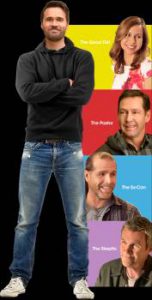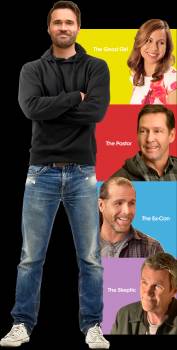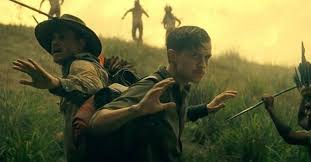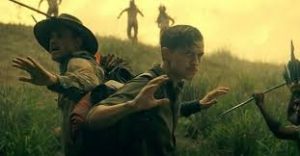Interview: Dallas Jenkins of “The Resurrection of Gavin Stone”
Posted on April 13, 2017 at 8:00 am

Director Dallas Jenkins spoke to me about his charming and touching film, “The Resurrection of Gavin Stone.” Brett Dalton stars as the spoiled former child actor who gets into trouble and is sentenced to community service, where he starts as a janitor and ends up playing the part of Jesus in a church Passion Play directed by the pastor’s daughter, played by Anjelah Johnson-Reyes.
Tell me where the idea came from, how did it start?
A couple of years ago when I was developing a few ideas for movies. I live in Chicago now, I’m working at a church in Chicago and we were working on a few ideas. I had a random breakfast meeting with someone and they mentioned the script and when they told me the storyline of a guy who pretends to be a Christian but he can play the part of Jesus in his passion play, I immediately liked it and because I could immediately see the humor of him trying to navigate through church world, trying to learn the language that Christians use and trying to figure out all the Christian clichés that he could sound like a Christian. I love the humor, but also by playing the part of Jesus he’s going to learn more about Him and going to become part of this church. So from both a humor perspective and an emotional perspective it just felt right to me. It felt like an opportunity to tell a story about church but through the eyes of an outsider so it could appeal to both worlds. It just really felt like the kind of project that would appeal to both church insiders and church outsiders and it came together pretty quickly.
It was good to see Anjelah Johnson-Reyes, known for her comedy, in a role that gave her a chance to be a little more serious.
Months and months before we made the movie my wife and I were talking about the part of the pastor’s daughter. This was a Midwest church and I didn’t want the part to look too Hollywood. My wife said, “You know, there’s an actress in the movie ‘Chipmunks the Squeakquel’ who has the character look you’re talking about.’ So, we popped in the DVD to take a look at it and immediately I said, ‘Oh she’s great. That’s exactly what I’m looking for,” I think standup comedians actually make good actors because they just have a good understanding of emotion and timing.
And I looked her up and I didn’t realize that she was a Christian. And so, when I found out she was married to a Christian hip-hop artist and we actually had some mutual friends. It was all completely random and completely coincidental and so through my mutual friends I contacted her and said I really wanted her to audition for this part. She was skeptical and I just said, “Well just read the script and see what you think.” She read it and loved it right away and then she came in and auditioned and did a great audition and the producers agreed that she would right for the part.
So it all started with her Chipmunks movie and now we’ve become great friends and she does a great job in the film. It is funny because she’s playing the part of someone who doesn’t know how to tell a joke, someone who takes herself too seriously. I think it appealed to her because it was different than what she normally does.
What makes this movie different from most Christian films?
We heard this over and over again: “I don’t normally like Christian films but I love this.” I think the humor has a lot to do with that. I think sometimes we Christians can take ourselves pretty seriously. Our movies are usually message-driven as opposed to story-driven which isn’t always a bad thing. I’m not criticizing that. But I think the humor in this film really stood out. The quality of the acting and the story can appeal to and be related to by church outsiders. I think the humor takes the sting out of it a little bit, makes it feel a little bit less propaganda, and so I think people just have responded to that.

Gavin Stone has a lot to learn obviously about grace and who Jesus really was. So do the Christians, and so do the churchgoers. And the pastor’s daughter herself learned as much about grace and about who Jesus was as Gavin does because she had taken it for granted and so he is impacted by the church and the church is also impacted by him. Being willing to acknowledge that the church has its own strengths and weaknesses and being willing to poke a little at the fun at it, I think again takes the sting out of it a little bit for people and makes it feel less like a sermon.
Part of that comes from D.B. Sweeney as the pastor, who is a great character.
He’s just a normal guy and the first time you see him on screen he communicates both in his words and his behavior that he is not intimidating and he is not pious. He admits he is still figuring out a lot about this himself and about the Christian faith. He’s not perfect. He doesn’t have it all together and he is willing to acknowledge that but yet at the end of the day he is a father, he’s a pastor who’s been there for decades and has a lot to teach and a lot to impart. But it’s coming from the perspective of somebody who is not pretending to be perfect. The whole conceit of this movie is that Gavin is pretending to be a Christian and I didn’t want the pastor to be stupid and not be able to tell that something may be a little wrong. He knows that something is very off but ultimately realizes Gavin Stone playing the part of Jesus is going to have a much better chance of impacting him than cleaning toilets. He says to his daughter at one point, “Isn’t this why we do what we do?” Having the opportunity to have an impact on someone — that’s the whole theme of the movie, that line.
Is Gavin Stone a good actor?
We really specifically made a choice to make Gavin Stone a very good actor and one of the key parts to illustrate that was his audition. The original script had him doing the scene from “Braveheart,” you know, “They’ll never take away our freedom” speech and I thought that would come across as humorous. I wanted that part where he gives his audition to actually be serious, to show that he is actually a really good actor and is going to bring something special to this church.
And so, I moved the “Braveheart” speech to the prayer scene where Gavin is asked to pray for the first time and he doesn’t know how so it’s just “Braveheart.” And then I found a speech from “Hamlet” and I put that as the audition and it turned out that it happened to be the same speech and monologue that Brett had used in real life to audition for the Yale School of Drama. And so that’s one of the things that really connected Brett to that script. The only way this was going to be pulled off that Gavin could quickly and on his feet convincingly portray the part of a churchgoer is that he’s a good actor and we had to portray that going in.
I also liked his interaction with his estranged father, played by Neil Flynn.
Neil is a really good actor and again a normal guy; he is actually from Chicago so he plays the part of the Midwest dad perfectly. We just wanted to have some moments away from the church setting and that allowed us to experience Gavin in some of his natural environment so that we could see who he was for real when he wasn’t pretending to be somebody else.
Gavin was spoiled. Hollywood has actually damaged him a little bit. You see that his father wasn’t a big fan of Gavin’s lifestyle choices and that he wasn’t a big fan of him being a child actor. At one point his father says, “I wanted to protect you, you know I didn’t want you to become selfish.” That’s what being sometimes a child actor can bring out when you are a celebrity too soon you can create a selfishness. And so I just kind of wanted to paint more shades of gray that Gavin’s father maybe he was really harsh at times but wasn’t entirely wrong and Gavin’s choices weren’t always the best but also weren’t entirely wrong and that he had something to say too. So we just wanted to tell a story that wasn’t always black and white.
Do you have a favorite Bible verse?
Psalm 34:5 — “Those who look to him are radiant, their faces will never be ashamed.” I’m guilty of this too: my career, my choices, where I’m going to be in five years? What is my plan? And I’ve learned over the years that where I am at in five years is none of my business and that verse really speaks to me because when you’re looking to God, when you’re looking up then you don’t have to worry about not only the practical things of life but you also don’t have to deal with the shame of your humanity. And so that phrase, “those who look to him are radiant,” I found that to be true over and over.





